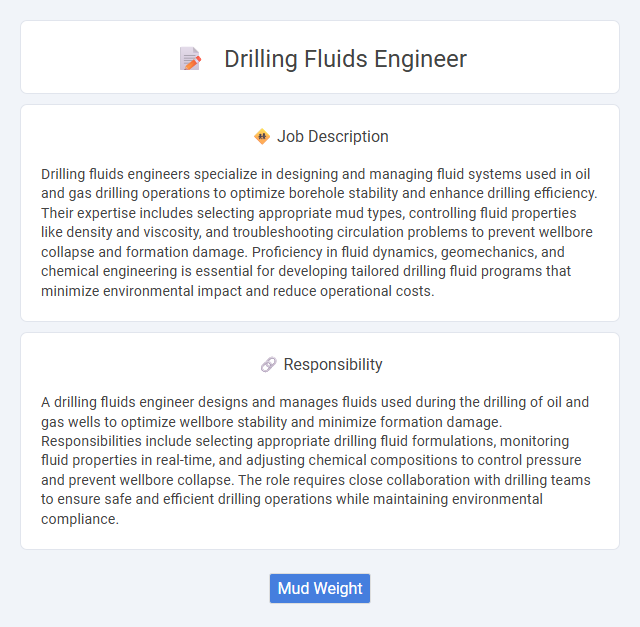
Drilling fluids engineers specialize in designing and managing fluid systems used in oil and gas drilling operations to optimize borehole stability and enhance drilling efficiency. Their expertise includes selecting appropriate mud types, controlling fluid properties like density and viscosity, and troubleshooting circulation problems to prevent wellbore collapse and formation damage. Proficiency in fluid dynamics, geomechanics, and chemical engineering is essential for developing tailored drilling fluid programs that minimize environmental impact and reduce operational costs.
Individuals with a strong background in engineering and a keen interest in geology may find the role of a drilling fluids engineer suitable due to its technical and problem-solving demands. The job likely requires working in challenging environments, often on-site in remote locations, which could affect those sensitive to physically demanding or isolated conditions. Candidates who adapt well to dynamic, high-pressure work settings and possess strong analytical skills have a higher probability of thriving in this career.
Qualification
Drilling fluids engineers typically require a bachelor's degree in petroleum engineering, chemical engineering, or a related field, with specialized training in drilling fluid systems and their chemical properties. Professional certifications such as the Society of Petroleum Engineers (SPE) certification or specific mud engineering courses significantly enhance expertise and career prospects. Strong analytical skills, knowledge of fluid mechanics, and experience with industry-standard software are essential for optimizing drilling fluid performance and ensuring wellbore stability.
Responsibility
A drilling fluids engineer designs and manages fluids used during the drilling of oil and gas wells to optimize wellbore stability and minimize formation damage. Responsibilities include selecting appropriate drilling fluid formulations, monitoring fluid properties in real-time, and adjusting chemical compositions to control pressure and prevent wellbore collapse. The role requires close collaboration with drilling teams to ensure safe and efficient drilling operations while maintaining environmental compliance.
Benefit
A drilling fluids engineer likely improves wellbore stability and reduces non-productive time by designing and optimizing drilling fluid systems. This role probably enhances safety and environmental compliance through careful fluid management, minimizing risks associated with drilling operations. Employers might gain cost savings and increased efficiency, making the position valuable in the oil and gas industry.
Challenge
Drilling fluids engineers probably face significant challenges in maintaining the optimal balance of fluid properties under varying downhole conditions, which directly impact drilling efficiency and safety. The complexity of predicting fluid behavior in high-pressure, high-temperature environments may require continuous adaptation and innovative problem-solving. Managing environmental regulations and minimizing ecological impact also likely adds layers of difficulty to their role.
Career Advancement
A Drilling Fluids Engineer plays a critical role in optimizing fluid systems to enhance drilling efficiency and safety, opening pathways to senior technical positions and project management roles in oil and gas companies. Expertise in fluid dynamics, chemical engineering, and real-time problem-solving accelerates career growth, leading to opportunities in global operations and innovation teams. Continuous professional development, including certifications like SPE or API, significantly boosts prospects for advancement and leadership within the energy sector.
Key Terms
Mud Weight
Drilling fluids engineers specialize in optimizing mud weight to balance formation pressures and prevent wellbore collapse during drilling operations. Accurate mud weight control is crucial for maintaining well stability, minimizing formation damage, and avoiding blowouts or lost circulation. Using real-time data and advanced rheological measurements, these engineers adjust fluid density to enhance drilling efficiency and safety.
 kuljobs.com
kuljobs.com